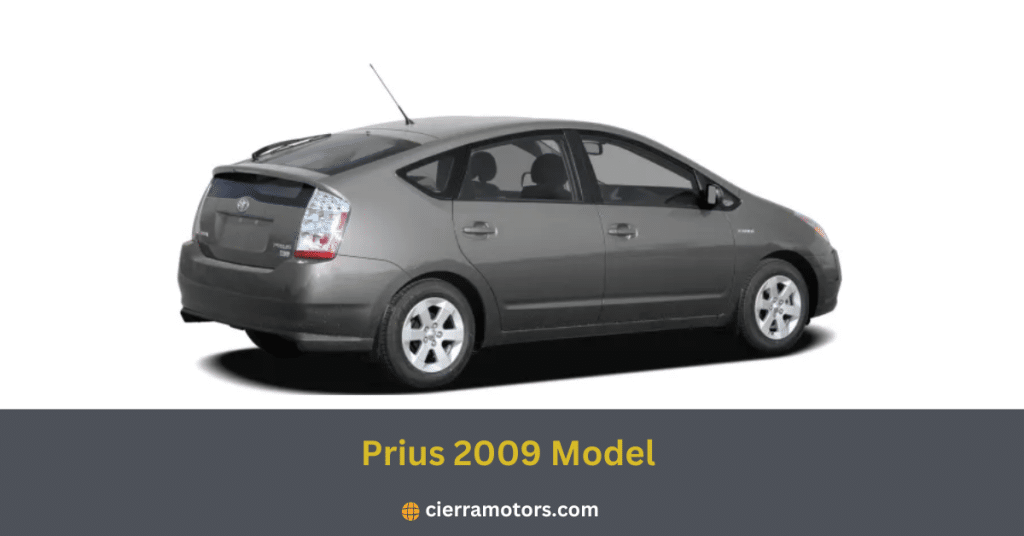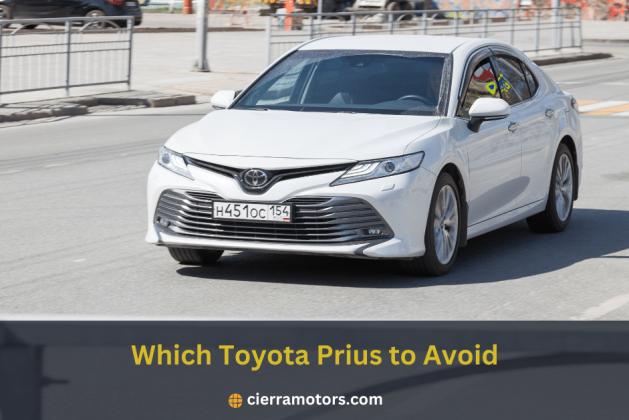Introduction to the Toyota Prius Model Range
Toyota’s commitment to environmental stewardship is manifested through its flagship hybrid, the Prius. Since its debut, it has evolved significantly, spawning different models to cater to diverse consumer needs. Understanding the breadth of the Prius lineup is the first step to knowing which model might be suitable for you.
The Prius originally started as a compact hatchback. Still, today, it encompasses an array of iterations, including the standard Prius, the versatile Prius V, the compact and sporty Prius C, and the plug-in hybrid Prius Prime. Each model offers a dynamic blend of fuel economy, technology, and practicality, but specific versions stand out more than others for various reasons – not all of them are suitable.
Understanding the Toyota Prius
Before we can pinpoint which Toyota Prius models to steer clear of, it’s necessary to delineate the variables that come into play when selecting a Prius. Factors like model year, trim levels, technological features, and available options can significantly impact the overall ownership satisfaction for consumers.
Factors to Consider When Choosing a Prius
When buying a Prius, it’s essential to consider your individual needs. Are you seeking top-tier fuel efficiency above all else? Do you require a larger vehicle for your family? Are hybrid-exclusive technologies a deal-breaker for you? These questions should guide your decision-making process:
- Fuel Efficiency: The heart and soul of the Prius, regardless of model, has always been its unparalleled fuel efficiency. However, later models tend to offer incremental improvements in this area.
- Technology and Features: As with most modern cars, the technology package in a Prius can make or break the experience. Infotainment systems, safety features, and comfort amenities vary widely between Prius models and model years.
- Size and Space: The standard Prius offers cabin space and fuel economy balance, while the Prius V is more giant and family-oriented. The Prius C, on the other hand, is more compact and geared towards urban living.
- Cost and Value: One of the key attractions of the Prius is its cost-saving potential over time. However, fluctuations in battery and technology costs may affect the MSRP and total cost of ownership.
Models to Avoid
Not all Toyota Prius models have been met with universal acclaim. Some have garnered a reputation for issues ranging from suboptimal performance to potentially expensive mechanical problems. Here are some models with known issues that may not live up to the Prius’ reputation for reliability:
First- and Second-Generation Prius (2001-2009)

Prius 2009 Model
These early models are where the Prius legacy started but have also been associated with specific problems as they’ve aged:
- 2001-2003: Owners of these model years may have experienced electrical systems and transmission issues. The severity can range from an occasional inconvenience to a significant repair cost. The problem may be more prevalent in the 2001 model, which was also subject to a recall for faulty power steering systems.
- 2004-2009: The traction battery in these vehicles is another potential pain point, with some units losing capacity earlier than expected. This can impact fuel efficiency and require a costly replacement over time. Some owners have also reported issues with the combination meter, which displays speed and fuel levels. information
Third-Generation Prius (2010-2015)
The introduction of this model brought numerous improvements, but not without its own set of caveats:
- 2010: A common issue reported by owners of the 2010 model involves the inverter failing, which leads to a complete loss of propulsion. This problem can significantly impact the vehicle’s performance and may require thorough diagnostics to identify the root cause before implementing necessary repairs or replacements.
- 2012-2015: These models have been observed to exhibit higher oil consumption levels than typically expected, potentially signaling underlying engine issues that demand prompt attention to prevent further damage and ensure optimal performance.
Fourth-Generation Prius (2016-Present)
The newest iterations of the Prius boast state-of-the-art features but may also harbor new issues:
- 2017: Some owners have reported that the multimedia and navigation system is prone to freezing and malfunctioning.
- 2019-2020: Reports of premature tire wear have surfaced among several drivers, necessitating more frequent replacements.
It’s important to note that while these models have known issues, not all vehicles within these model years will necessarily experience problems. However, they serve as a cautionary tale for prospective buyers.
Alternative Options
Thankfully, not all Prius models are shrouded in consumer dissatisfaction. Some versions have been lauded for their reliability and performance, making them more attractive contenders for the discerning buyer.
Prius Prime
The Prius Prime differs from the traditional Prius lineup as it is a plug-in hybrid. With its more extended electric range and high standard feature set, the Prius Prime offers a compelling case for those looking to maximize their daily electric driving while still having the convenience of a hybrid.
Prius 2009 and 2010
Some of the more resilient models of the Prius range, these iterations are less prone to the known issues faced by similar model years, making them a safer bet for a used vehicle. We’ve also seen improvements in technology and fuel efficiency over time, making these models an attractive balance between reliability and value.
Research and Test Drive
Engaging in thorough research and taking the time to test drive various models can be the most illuminating part of car-buying. Look into each model’s specific reviews, learn about the typical issues they may face, and take note of their average repair and maintenance costs.
Tips for Car Buyers
Navigating the used car market, especially for hybrid vehicles with intricate powertrains, can be daunting. Here are some practical tips that every potential Prius buyer should keep in mind:
Thorough Inspection is Key
Before signing on the dotted line, it is vital to have a used Prius inspected by a trusted mechanic, preferably one with knowledge of hybrid systems. They can look for any sign of battery degradation, electrical faults, or other potential issues that might not be apparent during a standard test drive.
Maintenance Records
A comprehensive record of a Prius’ maintenance history can provide valuable insights into the care it’s received. Regular service, especially on the hybrid system, can significantly prolong the car’s lifespan.
Buying from a Reputable Dealer
When faced with uncertainty about your choice, purchasing from a reputable dealer is always a wise decision. These dealers are known for their commitment to offering high-quality certified pre-owned Prius models that have undergone thorough inspection and refurbishment processes, ensuring you get a reliable and top-notch vehicle.
By choosing a reputable dealer, you can have peace of mind knowing that your purchase is backed by their expertise and dedication to customer satisfaction. You can also take advantage of financing and warranty options that may not be available with a private seller.
Conclusion
Choosing a Toyota Prius is a decision rooted in sensibility and sustainability. As eco-conscious buyers and budget-oriented consumers continue to flock to this iconic hybrid, it’s more important than ever to be informed about which models to approach with caution. By considering the potential issues associated with specific Prius models and exploring alternative options, you can ensure that your next Prius purchase is one you’ll be happy with for years to come. Remember, it’s not just about avoiding the problems you can foresee—it’s also about finding the Prius that best suits your lifestyle and needs.
FAQs
Q: What is the most reliable year for a used Prius?
A: Based on consumer reports and owner satisfaction surveys, the 2009 model is considered one of the more reliable and long-lasting editions of the Prius lineup.
Q: Are there any common issues with newer Prius models?
A: While all models have their own potential problems, some common issues reported by owners of newer Prius models include multimedia system malfunctions and premature tire wear.
Q: Can I trust a used Prius from a private seller?
A: While there are undoubtedly honest private sellers, purchasing from a reputable dealer offers more assurance as they often have certified pre-owned options and warranties. Additionally, dealerships typically have more knowledge and expertise with hybrid vehicles. So, it is always recommended to do thorough research and consider buying from a reputable dealer before purchasing.
Q: Should I be concerned about battery life when purchasing a used Prius?
A: It’s important to note that the life of a hybrid battery can vary greatly depending on usage, maintenance, and driving habits. However, it’s always recommended to have the battery inspected and tested before purchasing a used Prius, especially from a private seller. Buying a certified pre-owned model or one with a good maintenance record can also provide more peace of mind regarding battery life.
Q: Are there any recalls on Prius models?
A: There have been several recalls on various Prius models over the years. It’s essential to check for any active recalls before making a purchase and stay updated on any future recalls that may arise.



Leave a comment